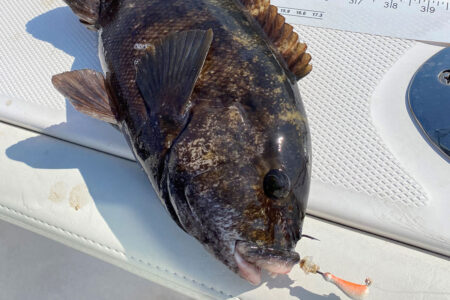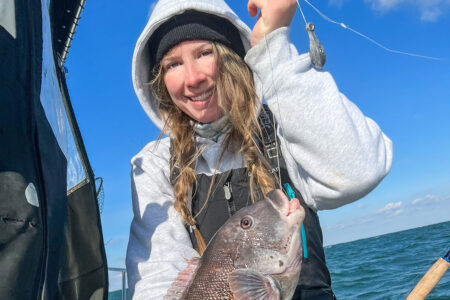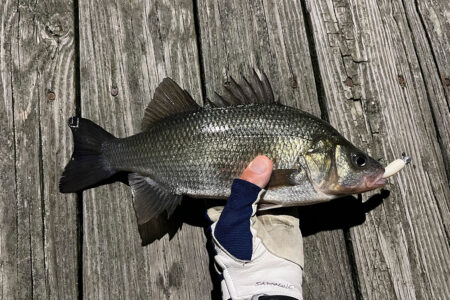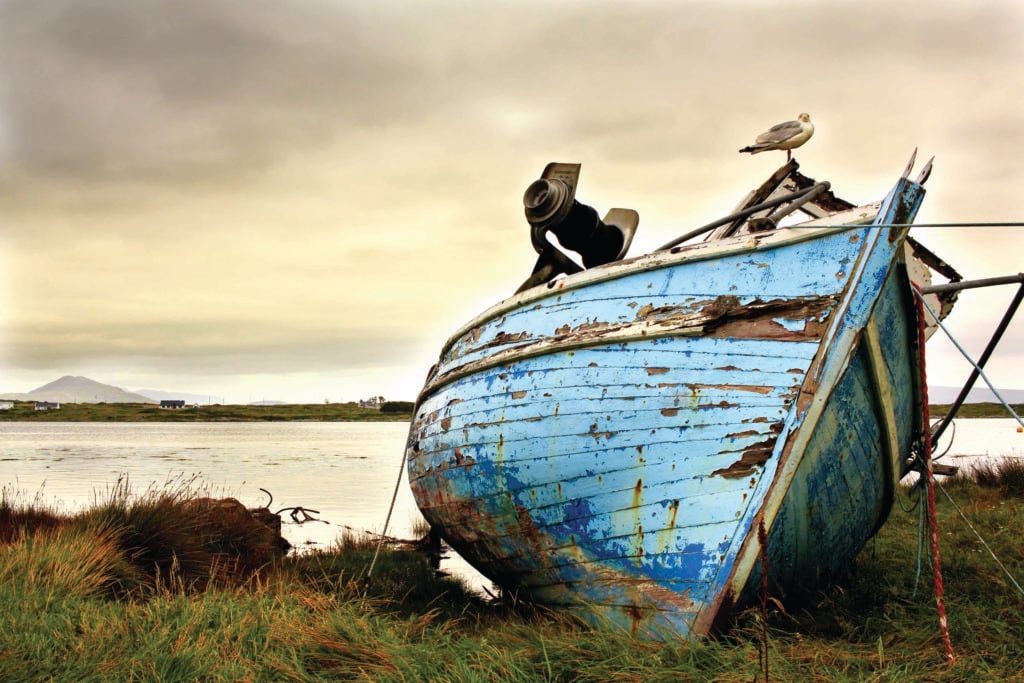
Unquestionably, those long-ago four blackfish were my stepping stones on the path to broader fishing knowledge.
Of all the bottom feeders we fellows catch, the most difficult to get a hook into is the blackfish. Surely it stands at the head of the class. This wily, pugnacious cuss has caused the average sinker bouncer more frustration than all others combined.
At least this is the way I’ve always found it to be, and especially is this so at the beginning of one’s fishing career.
At the beginning of my fishing career you might say that for a budding fisherman I was a pretty dumb kid, for I was 11-years-old before I saw my first blackfish, which, when you take into consideration that in my Brooklyn neighborhood first-rate bottom fishermen abounded, this face did make me a little slow on the draw.
Because there were so many fishermen in Brooklyn, tackle shops were never too far away. I don’t know if you ever heard of John Gliebe’s tackle shop, then located on Myrtle Avenue near Broadway, but at the time Gliebe’s was the place to go for excellent custom-made rods, the best reels and service, sturdy terminal tackle and the largest and sassiest blood and sandworms.
In the later years I bought many a rod and reel from Gliebe’s in addition to long-forgotten flats of sandworms for Jamaica Bay weakfishing, and I got to know Mr.Gliebe and his son John pretty well. But at the tender age of 11 I had yet to be inside the shop. There were always groups of master fishermen inside and I figured they wouldn’t enjoy having a kid underfoot and taking time out from their discussions to answer all those questions I had an uncontrollable urge to ask; therefore, I was content to stand by the store windows and feat my eyes on the splendid array of tackle I was eating my heart out to possess.
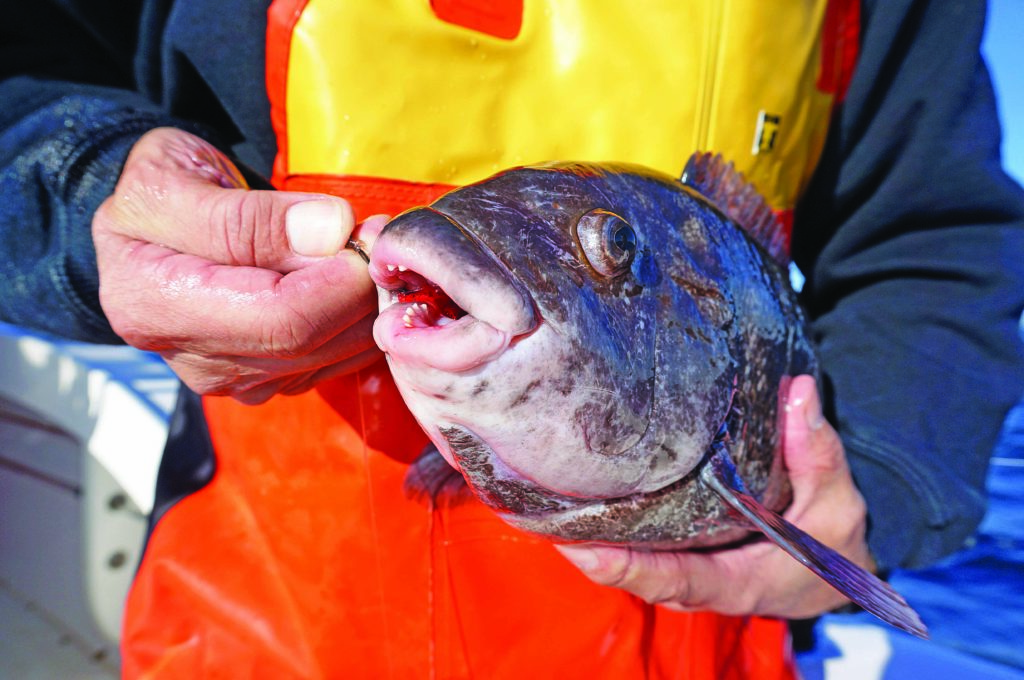
I’m sure Gliebe’s shop was a good four-mile hike from my neighborhood, but that didn’t faze me one bit. I cheerfully hoofed it, rain or shine, for to be so close to all that fine tackle and those excellent fishermen was reward itself.
One balmy May evening I started out and never got there. While walking along Myrtle Avenue and approaching the neighborhood speakeasy (this of course was during the Prohibition days), I came upon an excited crowd milling around outside the establishment. I was sure it was just on more police “speak easy” raid and made to walk around the confusion and continue on. Not even the excitement of a police raid was going to keep me from my planned visit to Gliebe’s store windows.
But there was no police raid going on. Instead, there were four or five strapping fishermen bending over several bushel baskets of blackfish. There must have been at least 100 fish in those baskets and they were being given away to whoever wanted them. There was no want of takers. I came away with an easy 5-pounder. Needless to say, I didn’t visit Gliebe’s that evening.
I found several sheets of newspaper in a trash receptacle, wrapped the fish in these, and scooted for home. I was in my glory. Here was a fish I had never seen before and I could study it to my heart’s content, knowing full well that the next day I could check with the neighborhood fishermen for further information.
And you can bet I checked. I must have driven those poor guys to distraction with my questions. From one of these fellows I received the best piece of fishing advice I have ever gotten. “Kid,” he said, “if you want to become a good fisherman. First learn to catch blackfish. If you do that, all the others will become duck soup.”
Ah, the truth of that!
But of what good was the untested knowledge I possessed if I had nowhere to use it? Going out on a Canarsie party boat was beyond my means in 1925, for a tad of my age at that time was lucky to have two nickels to rub together. So, that summer I put a dent in the snapper population and let it go at that.
I’m told the good Lord takes care of fools and drunkards, Well, let me add a postscript to that. He also takes care of kids who want to go blackfishing so bad, they can taste it. That summer a new kid moved into the neighborhood. Martin Dyckman was his name and his father, a motorman on the Brooklyn Rapid Transit trolley lines, were dyed-in-the-wool fishermen.
Martin and I hit it off crack out of the box, and soon we were in to high-grade fish talk. I could offer little with my meager fishing experience, but Martin mesmerized me with tales of his fishing exploits. I guess you might say that in my eyes Martin was a god, and there was nothing I wouldn’t do to him talking about fish. When I think back at it now, it must have been shameful.
When I mentioned the desire to go blackfishing and the tough luck I was having bringing that desire to fulfillment, Martin said to fret no more. He and his father were blackfishing fans from ‘way back, and come October they would take me to Barren island on Jamaica Bay to do a little fishing in a spot they knew.
Well, you know how it is with kids, always impatient when goodies are offered. I had first met Martin in August and the two months or so I would have to wait for that promised trip was like waiting for an entire lifetime to pass. Time would not go by quickly enough, and when Mr. Dyckman came home from work each day, I made sure to post myself in a conspicuous place, for I was taking no chances he might forget who I was. Had he done so, I believe I would have died on the spot.
But, even misery must eventually come to an end, and one Saturday afternoon Martin gave me the word. “We’re going tomorrow. Pop says to be ready at four. We’ll leave in the dark, and he says not to bring you drop line; he has a rod and reel for you. He already bought the bait live green crabs.”
O Joyous Day!
I don’t think I slept that night. If I thought two months was a long time to wait, those hours until early morning seemed more of a strain than ever. You can bet I was standing at the curb with time to spare and doing plenty of fretting before Martin and his father rounded the corner in their 1922 Dodge Brothers sedan. For a kid to ride in a car those days was a big thing. I considered myself the luckiest of the lucky.
How long it took to get to Barren Island I don’t know, but I recall it was coming on daylight when we parked the car. There was some hiking to be done and when we stopped, we were on the bank of a creek that ran behind Barren Island. It was cold and there was frost on the marsh grass, but that meant nothing to me if the fish would bite.
Martin could handle a rod and reel like an expert, but I actually didn’t know a thing about casting (no spinning reels those days), baiting up, and all those other things experienced fishermen no longer think about. Mr. Dyckman was one fine gentleman and he took care of all the details, cheerfully taking time out of his own fishing to explain the importance of why this is done, and why that was done, and the reasons for this, and the reasons for that. As for casting, I couldn’t do it; but that didn’t bother Mr. Dyckman, he did it for me, explaining in detail what I must do if I got a bite.
Because I did no casting, I am at a loss as to how deep the creek was; but it seems to me a guess of 15 to 20 feet would be close. After I had been snagged a few times on bottom obstructions, Mr. Dyckman told me the area was littered with concrete railroad ties that had spilled overboard during a violent windstorm several years before. I wasn’t expecting to pay for those lost rigs. Yes sir, Mr. Dyckman will always be number one in my book.
I don’t know how you made out on your first blackfish trip, but I didn’t do too well. I quickly discovered that second-hand knowledge, which did serve me in good stead because I could anticipate some of the action, was still a far cry from personal experience. I got bites, all right, but those explained Mr. Dyckman was mostly bergall bites and, like every fisherman, I couldn’t distinguish one from the other, which made me low an on the totem pole.
But as the day progressed, I improved; and when quitting time came (much too quickly and much to my sorrow), I had four blackfish from one-half pound to a husky 2-pounder. Martin and his dad had an easy two dozen between them, so you see, the fish were there. It just took experience to catch them.
That catch of four blackfish may have been meager when compared to those I was slated to make in the future. They proved that with a little perseverance I could catch the wiliest and most cunning of all our bottom feeders. Unquestionably, those long-ago four blackfish were my stepping stones on the path to broader fishing knowledge. I’ll tell you truthfully, whatever good fishing I’ve enjoyed over the years is due to those four blackfish. No question about it!

